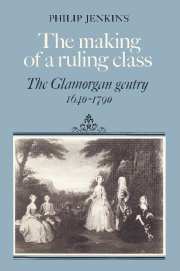Book contents
- Front matter
- Contents
- List of maps and tables
- Acknowledgments
- Abbreviations
- General introduction
- PART I SOCIAL AND ECONOMIC STRUCTURE
- PART II LOCAL AND NATIONAL POLITICS
- PART III SOCIETY AND CULTURE
- Introduction
- 7 The idea of a gentleman
- 8 Education and culture
- 9 The spread of metropolitan standards
- Conclusion to Part III: ‘conspicuous antiquity’
- Aftermath: towards the Victorian world
- Conclusion: from Civil War to Industrial Revolution
- Appendix 1 Parliamentary service by Glamorgan landowners 1640 – 1800
- Appendix 2 The ‘secondary’ gentry families
- Appendix 3 The ‘tertiary’ families
- Appendix 4 The Mansell family and their connections with the greater gentry
- Appendix 5 The roundhead and puritan family links of the Thomases of Wenvoe
- Notes
- Index
- Front matter
- Contents
- List of maps and tables
- Acknowledgments
- Abbreviations
- General introduction
- PART I SOCIAL AND ECONOMIC STRUCTURE
- PART II LOCAL AND NATIONAL POLITICS
- PART III SOCIETY AND CULTURE
- Introduction
- 7 The idea of a gentleman
- 8 Education and culture
- 9 The spread of metropolitan standards
- Conclusion to Part III: ‘conspicuous antiquity’
- Aftermath: towards the Victorian world
- Conclusion: from Civil War to Industrial Revolution
- Appendix 1 Parliamentary service by Glamorgan landowners 1640 – 1800
- Appendix 2 The ‘secondary’ gentry families
- Appendix 3 The ‘tertiary’ families
- Appendix 4 The Mansell family and their connections with the greater gentry
- Appendix 5 The roundhead and puritan family links of the Thomases of Wenvoe
- Notes
- Index
Summary
The traditional gentry community had been firmly embedded in local traditions, local justifications for their power and existence, local expectations of what they owed to their neighbours and inferiors. However, in the course of the eighteenth century the old community fragmented, while rapid economic change contributed to widening class divisions. The gentry community increasingly tended to share the views of ruling groups from elsewhere in Britain and like them, they adopted a new common culture emanating from London.
In this final section, I want to analyse what gentility meant in this period, and how it was affected by the social and demographic changes of the early eighteenth century. Change was very considerable, for several reasons. Firstly, there was the disappearance of the old families, and with them the patronage of art, culture and the other ways in which gentility had once been proclaimed to the world. Secondly, we observe the coming of new standards, which condemned many traditional forms of gentility as vulgar, barbaric or ostentatious. Following on from this latter critique was the question of how leisured gentlemen justified their existence if work was godliness, and social use was the highest goal? It no longer sufficed to say that the gentry served a social purpose by practising indiscriminate charity to the poor, when this was seen as an irresponsible and archaic means of promoting idleness.
Information
- Type
- Chapter
- Information
- The Making of a Ruling ClassThe Glamorgan Gentry 1640–1790, pp. 193 - 195Publisher: Cambridge University PressPrint publication year: 1983
Accessibility standard: Unknown
- 1
- Cited by
